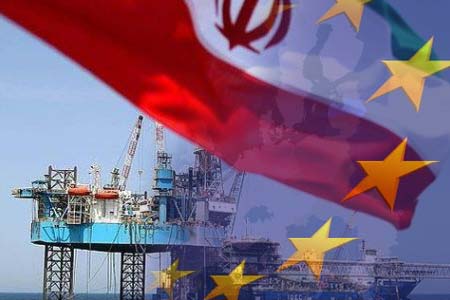EU member states have announced a new package of sanctions against Iran over its controversial nuclear programme.
Foreign ministers meeting in Luxembourg “significantly broadened EU restrictive measures”, focusing on Iranian banks, trade and gas exports, officials said.
The ministers reiterated their “serious and deepening concerns” over Iran’s nuclear activities and their commitment to “work for a diplomatic solution”.
They suspect Iran is seeking to develop nuclear weapons, something it denies.
Analysts say the unilateral sanctions announced by the US and EU, as well as those imposed by the UN Security Council, have done significant damage to the Islamic Republic’s economy.
Earlier this month, riots broke out when Iran’s currency, the rial, plunged to new lows against the dollar, according to local currency exchange websites, having lost 80% of its value since the start of the year.
The Council of the European Union said the new sanctions agreed targeted Iran’s nuclear and ballistic missile programmes, and government revenues allocated to them.
“They are meant to persuade Iran to engage constructively by negotiating seriously and addressing the concerns of the international community,” a statement said.
“The sanctions are not aimed at the Iranian people.”
The Council prohibited all transactions between European and Iranian banks, unless they are explicitly authorized by national authorities under strict conditions.
There will be a ban on short-term export credits, guarantees and insurance. Medium- and long-term commitments are already banned.
The ministers also prohibited the export to Iran of further materials relevant to the Iranian nuclear and ballistic programmes or to industries controlled by the Islamic Revolution Guard Corps (IRGC), including graphite, raw or semi-finished metals such as aluminium and steel, as well as software for integrating industrial processes.
The import, purchase and transport of natural gas from Iran was also banned, mirroring the more significant embargo on oil imports which came into effect in July.
European companies were also forbidden from providing shipbuilding technology and oil storage capabilities, as well as flagging and classification services to Iranian tankers and cargo vessels.
Finally, the Council targeted 34 additional Iranian entities allegedly providing substantial financial support to the Iranian government and one person involved in the Iranian nuclear programme with an asset freeze and a travel ban. Those affected will be named on Tuesday.
“The objective of the EU remains to achieve a comprehensive, negotiated, long-term settlement which restores international confidence in the exclusively peaceful nature of the Iranian nuclear programme, while respecting Iran’s legitimate right to the peaceful use of nuclear energy under the Non-Proliferation Treaty,” the EU statement said.
The EU’s foreign policy chief, Catherine Ashton, told reporters before Monday’s meeting that there was still “room for negotiations” between Iran and the P5+1 – the UK, US, France, China, Russia and Germany.
The P5+1 have asked Iran to stop enriching uranium to 20%.
The Iranian government says it requires 20% enriched uranium for its medical research reactor in Tehran, but Western experts say it could be converted to weapons-grade material within six months.
Meanwhile, Sweden has summoned Israel’s ambassador in Stockholm. The move came after an Israeli foreign ministry official was quoted by the Haaretz newspaper as saying the Swedish government would oppose further sanctions to protect a deal between the telecommunications group, Ericsson, and the mobile operator, Irancell.
Swedish Foreign Minister Carl Bildt condemned the “mudslinging”, telling the TT news agency: “This is not how I think mature nations should interact with each other and I will react quite sharply against Israel.”
In a separate development on Monday, the leading European satellite provider Eutelsat took 19 Iranian state-run television and radio channels off air on Monday, citing “reinforced EU Council sanctions”.
People in the Middle East will still have access to most of the channels operated by Islamic Republic of Iran Broadcasting (Irib) – including English-language news service, Press TV, and Arabic-language al-Alam – but they will no longer be available in Europe except via the internet.
